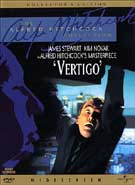 |
|


|
Vertigo is considered by many to be Alfred Hitchcock's best movie. I haven't seen all of Hitchcock's movies, so I can't weigh in on the matter, but I can say that Vertigo, especially since its restoration, is one of the best films in American cinema history. John "Scottie" Ferguson (Jimmy Stewart) is a curmudgeonly bachelor detective living in San Francisco. Following a close call while apprehending a suspect, Scottie develops a debilitating case of vertigo. Retiring from the force, the independently wealthy Scottie decides to become a man of leisure. (It comes off as far more believable in the film than it does in my synopsis.) An old college friend calls on Scottie for help when his young wife, Madeleine (Kim Novak), begins to act strangely. Scottie finally takes the case, following the woman and becoming embroiled in a mystery involving ghosts, heartbreak, and suicide. The film explores Scottie's obsession with the beautiful Madeleine and the woman with whom Scottie tries to replace her after Madeleine's tragic death. The thing that struck me about Vertigo is how surprised I was that I didn't like Scottie. He's creepy. It's Jimmy Stewart! How can I not like his character? He and Madeleine are desperately in love, right? It's sad and sympathetic and romantic, right? Well, not really. I was troubled by the suddenness of their love. It's actually too desperate, too quick. That's the heart of Vertigo and I think the heart of why Scottie isn't very likable. The film is about obsession. Obsession is, by definition, out of control. We do things that aren't nice, aren't civilized, aren't acceptable in the midst of obsession. It's painful to watch and it's uncomfortable. Hitchcock's films have a tremendous capacity to force us to confront the "ickiness" of our own emotions. Scottie's unlikable, but he's thoroughly Everyman. It's an amazing exploration. Vertigo is often treated as a mystery thriller. To some extent, it does provide thrills, but the mystery is solved fairly quickly. The film is more psychological than that. It's ability to creep us out, to disturb us, is subtle and emotional. In the best Hitchcock fashion, the movie leaves you feeling a little rawer, a little more exposed, and a little more human in the end. I can't put my finger on it. I know it's there, though. Why else would I become so captivated by the emotional struggle of a man I don't like?
The restoration of Vertigo is amazing. The colors are vibrant (even the browns), providing visual clues I never noticed before. The assignation of colors to characters is more beautifully realized now. The down side of being so visually striking is that it leads you to notice things you wish you hadn't. For instance, Kim Novak has the most ridiculous eyebrows. The soundtrack has also been restored; background noises are clear without being overwhelming.
The extras include the documentary "Obsessed with Vertigo," which covers both the original filming of the movies and its restoration. There are also cast and crew bios, storyboards, location sketches, trailers, and stills. The extra to which I was especially looking forward ended up being the most disappointing. The commentary, by restorers Robert A. Harris and James C. Katz and Vertigo's associate producer Herbert Coleman, as actually pretty tedious. Harris and Katz lead Coleman through his recollections, often contradicting him and questioning his details in the process. Coleman just isn't a raconteur. The commentary is also interspersed with secondary commentary by others involved with the film (or their associates). Even Kim Novak's section, although more interesting than others, didn't hold much information. Unless you're a Vertigo fanatic or interested in the technical aspects of filmmaking and restoration, the 2 hours of commentary reduces to about 10 minutes total of useful or entertaining information. Lisa McInnis, 8/11/00 |
||||||||
|
|
|||||||||
